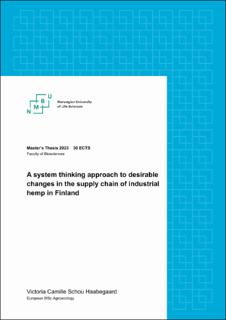| dc.contributor.advisor | Tor Arvid Breland, Faculty of Bioscience, NMBU | |
| dc.contributor.advisor | Ioanna Mouratiadou, ISARA | |
| dc.contributor.advisor | Aapo Korkeaoja, external supervisor | |
| dc.contributor.author | Schou Haabegaard, Victoria Camille | |
| dc.date.accessioned | 2023-11-23T17:27:26Z | |
| dc.date.available | 2023-11-23T17:27:26Z | |
| dc.date.issued | 2023 | |
| dc.identifier | no.nmbu:wiseflow:6907476:55526026 | |
| dc.identifier.uri | https://hdl.handle.net/11250/3104425 | |
| dc.description.abstract | Agroecosystems are complex systems, where interactions between socio-ecological and ecological processes take place. Modern agricultural systems tend to externalize costs of production and deplete the Earth’s resources. Diversified Farm systems (DFS) can contribute to providing ecosystem services and mitigate some of the adverse effects of modern industrial agriculture. Hemp is a resilient and fast-growing crop, that can be used for a multitude of purposes. It holds a strong potential for economic and industrial development in Europe. Soft system methodology, encompassing action-oriented research, participatory and qualitative methods, as well as system thinking is applied to address the problematic situation. A case study in Finland serves as the foundation for a systems inquiry into the supply chain of industrial hemp, where six categories are used to understand different aspects of the case. It is proposed that changes can be made to improve the current situation to reach a desired future situation. The current situation for supplying hemp is limited to a small established market for hemp seeds, and a developing market for hemp biomass. A desired future scenario for the supply chain of hemp includes a network of farmers, collaboration across industries and more industrial equipment for hemp harvest and processing, which will result in higher quality material and reliant supply. Transparency and trust across the supply chain may support the transition, whereas lack of funding and a competition mindset may hinder the transition. It is desirable to establish a network of farmers, which can contribute to knowledge sharing and new innovations in the supply chain. Making change in the current system requires a collaborative effort between key stakeholders and is influenced by supportive policy implementation. | |
| dc.description.abstract | | |
| dc.language | eng | |
| dc.publisher | Norwegian University of Life Sciences | |
| dc.title | A systems thinking approach to desirable changes in the supply chain of industrial hemp in Finland | |
| dc.type | Master thesis | |
